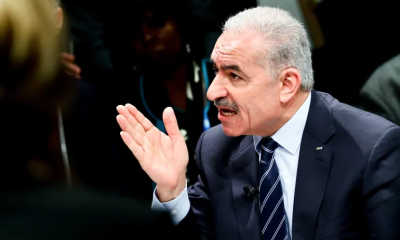Foreign News
Israeli settlers steal Palestinian farmers’ land in occupied West Bank
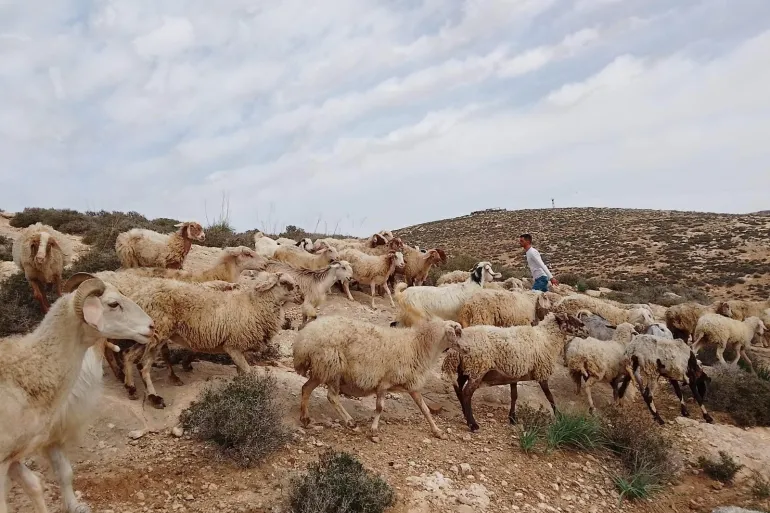
Farmers in the occupied West Bank face near-daily incursions and violence from Israeli settlers, to the point that they live in fear of having their homes and land stolen, they say.
Added to that is the violence they witness in nearby urban areas, like Jein city and refugee camp that the Israeli army stepped up raids on, killing 10 people and wounding 20 in just one week.
According to the Ministry of Health, at least 237 Palestinians have been killed and about 2,850 others injured by Israeli forces in the occupied West Bank since October 7.
Farmer Ayman Assad, 45, and his family can clearly hear the attacks from their home just 2km from the camp and they have made the past few weeks a nightmare for him, his wife and five children. “The children are constantly scared, and they don’t play outside any more, it’s too dangerous,” he told Al Jazeera. “We can hear the attacks on the refugee camp, explosions and gunshots.”
Assad said his children are no longer going to school because even if they were to brave the route there, the Israeli army is blocking many of the roads in the area. All classes have gone online.
The greatest worry right now is that his chicken farm, which is further away in Area C of the West Bank, will be attacked by Israeli settlers while he is unable to defend it. “I’m scared my land will be stolen.”

Palestine is known for its olives, olive oil and vegetables, which are exported far and wide. The olive trees, in particular, are an important symbol of Palestinians’ attachment to their land.
The West Bank has been occupied by Israel since 1967. Since then, about 700,000 Israeli settlers have illegally settled in the Palestinian territory. and have been stealing from, attacking and destroying olive groves, farmland and property there for years.
But these incursions have stepped up in recent weeks, as Israeli forces and settlers mount armed raids while Palestinians are confined to their homes under curfew, Abbas Milhem, director of the Palestinian Farmers’ Union (PAFU) in Ramallah said. His own family’s farm was among those targeted.
Just over two weeks ago, armed Israeli settlers invaded the Milhem farm, fired guns in the direction of the people working on the harvest and stole olives. One of the workers at the farm, Iman Abdallah Jawabri, 45, was harvesting olives in a crew that included her husband when five settlers came in.
“They shot towards us as if they wanted to scare us, then when they came closer, they took our phones to prevent us from taking photos of them. Then they told all the women to leave and started hitting the men, forcing them to sit on the ground under the olive trees. “We (the women) were still looking at them from afar. After this, they took all of our olives and forced us to leave.”
The farm is now under military control despite being in Area B of the West Bank, where the Palestinian Authority technically controls civilian matters. The Milhems and their workers have been unable to return. “The farmers are afraid of being shot if they do,” said Iman. “I have several grandchildren and fear for the future, but I also thank God for what we have and pray for the people of Gaza,” she added.
“There is a second war in Palestine which is happening in the occupied West Bank,” said Milhem. “It is also crucial to understand how it affects farmers in the occupied West Bank.”
He added that he cannot travel to visit his ageing mother in Jenin because Israeli forces have blocked many of the roads.
(Aljazeera)
Foreign News
Washington Post chief executive steps down after mass lay-offs
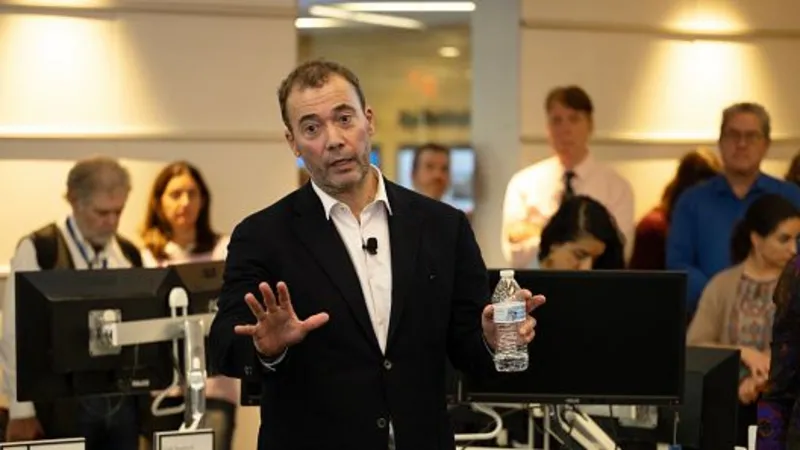
The chief executive of the Washington Post is stepping down, the newspaper has announced, days after overseeing mass lay-offs.
William Lewis said it was the right time to leave, saying in a message to staff that was shared online that “difficult decisions” had been made to ensure the paper’s future.
On Wednesday the newspaper announced it was cutting a third of its workforce, dramatically scaling back its coverage of sport and international news.
The decision was condemned by many journalists and prompted criticism of the Post’s billionaire owner, Jeff Bezos. Executive editor Matt Murray said the cuts would bring “stability”.
Jeff D’Onofrio, who joined as chief financial officer of the newspaper last year, will serve as acting publisher and CEO, the Post said as it announced Lewis’s departure.
A former Dow Jones chief executive and publisher of the Wall Street Journal, Lewis was appointed to the role at the Washington Post in 2023.
He has faced criticism from subscribers and employees as he tried to reverse financial losses at the daily.
Hundreds protested in front of the paper’s headquarters in Washington DC on Thursday after the mass lay offs, which included the paper’s entire Middle East staff and its Kyiv-based Ukraine correspondent.
Marty Baron, the Post’s executive editor until 2021, said the cuts ranked “among the darkest days in the history of one of the world’s greatest news organisations”.
The departure of Lewis marks the latest upheaval for the leading US newspaper, which has seen a series of staff cuts and controversial editorial decisions in recent years.
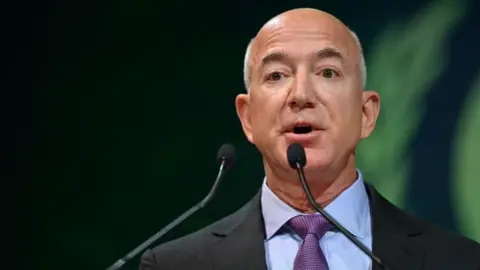
Shortly before the 2024 US presidential election, Bezos, the founder of Amazon, broke with decades of tradition by deciding the newspaper would not endorse a presidential candidate.
The newspaper had endorsed a candidate in most presidential elections since the 1970s – all of whom had been Democrats.
The move caused widespread criticism and led to the loss of tens of thousands of subscribers.
Meanwhile, the opinion editor resigned in February last year when Bezos decided to focus the paper’s comment section on “personal liberties and free markets”.
Bezos, who acquired the newspaper in 2013, said pieces opposing those views would not be published.
[BBC]
Foreign News
King Charles to host Nigeria’s first UK state visit in 37 years
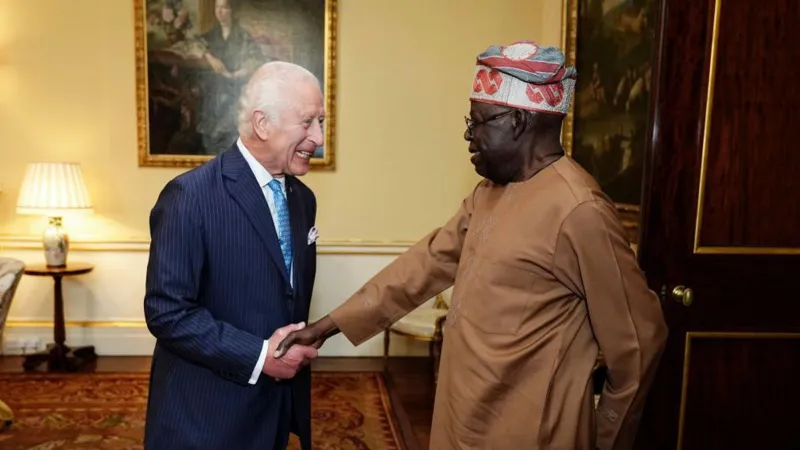
King Charles III and Queen Camilla will host Nigeria’s president in the country’s first state visit to the UK in 37 years, Buckingham Palace has announced.
Bola Tinubu and First Lady Oluremi Tinubu have accepted an invitation to be guests of the King at Windsor Castle from 18 to 19 March.
State visits are considered a form of soft-power diplomacy, using the pomp of royal hospitality to strengthen relations with important international partners.
The last Nigerian state visit to the UK took place in 1989, when military ruler Gen Ibrahim Babangida travelled to meet the late Queen Elizabeth II for a four-day trip.
Although this will be Tinubu’s first formal state visit to the UK, he has already met the King since taking office following Nigeria’s disputed election in 2023.
Tinubu and his wife were received at Buckingham Palace in September 2024 and also held a bilateral meeting with the King on the sidelines of the COP28 summit in Dubai.
But a state visit allows for ceremonial pageantry aimed at elevating the occasion and demonstrating the importance with which the UK views those visiting.
The visit comes at a time of improving diplomatic and economic links between the UK and Nigeria – with trade between the two worth more than £8bn in the year to October, government figures show. This makes the African nation one of the UK’s most important partners in the continent.
In 2024, the two countries signed a new trade and investment partnership designed to expand opportunities for business.
The agenda for the March visit has not been disclosed, nor details of the events planned for it – but state visits typically include carriage processions and a state banquet, and usually coincide with visiting leaders having political meetings.
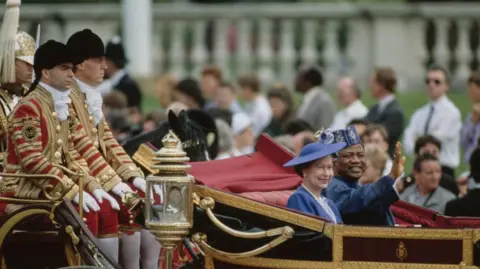
In 2025 alone, the King presided over three state visits – those of French President Emmanuel Macron, US President Donald Trump and German President Frank-Walter Steinmeier – the first time the UK had held such a number in a single year since 1988.
The King has longstanding ties to Nigeria, a Commonwealth country, having expressed a love for Pidgin English and Nigerian Afrobeats music.
Before becoming monarch, he visited the country four times as the Prince of Wales – in 1990, 1999, 2006 and 2018. Camilla, then the Duchess of Cornwall, joined him on the latter trip.
In 2023, the King’s Trust International – formerly the Prince’s Trust – officially launched in Nigeria, announcing a project aimed at tackling youth unemployment.
[BBC]
Foreign News
Colorado funeral home director sentenced to 40 years for corpse abuse

The co-owner of a Colorado funeral home where nearly 200 decaying bodies were found has been sentenced to 40 years in prison for corpse abuse.
Before Jon Hallford was sentenced, he apologised in court and listened to family members describe having nightmares about their loved ones decomposing in his care. They called him a “monster” who should rot in jail.
His ex-wife and co-owner Carie Hallford has pleaded guilty to similar charges and is awaiting sentencing.
The Return to Nature home, in the town of Penrose, Colorado, had given fake ashes to grieving relatives instead of their loved-ones’ remains. Prosecutors said 189 bodies were improperly stored in the building over four years.
-

 Business1 day ago
Business1 day agoZone24x7 enters 2026 with strong momentum, reinforcing its role as an enterprise AI and automation partner
-

 Business5 days ago
Business5 days agoSLIM-Kantar People’s Awards 2026 to recognise Sri Lanka’s most trusted brands and personalities
-

 Business6 days ago
Business6 days agoAll set for Global Synergy Awards 2026 at Waters Edge
-

 Business1 day ago
Business1 day agoHNB recognized among Top 10 Best Employers of 2025 at the EFC National Best Employer Awards
-

 Business5 days ago
Business5 days agoAPI-first card issuing and processing platform for Pan Asia Bank
-

 Business1 day ago
Business1 day agoGREAT 2025–2030: Sri Lanka’s Green ambition meets a grid reality check
-

 Editorial3 days ago
Editorial3 days agoAll’s not well that ends well?
-

 Features3 days ago
Features3 days agoPhew! The heat …


